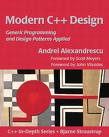Olivier Langlois's blog
Archives for: June 2007, 09
06/09/07
Modern C++ design
I read a lot of programming books (maybe too much sometimes... :-) and I think that I am getting very hard to impress but I must confess that this book is very special. It is one of the rare book that did really open my eyes on new possibilities for programming. What the author is doing with templates are things that I have never imagined possible.
The basic concepts presented in this book are policy based class design mixed with some template metaprogramming tricks. The rest of the book consist of revisiting classic design patterns such as smart pointers, singletons and factories by implementing them by using policies and template metaprogramming. The result is, to my opinion, impressive. Implementing these classes may at some point add some complexity but customizing the end result classes is incredibly easy, flexible and requires minimal changes.
Some people did not like the book by arguing that they were not sure if they would be using the patterns presented in the book. I agree with their position and I am not sure that I would find a usage for all the patterns presented in the book or if I would just not want them in my code by fear of the added complexity but in my opinion this is not a good criteria to judge the book. It is not important to know if you are going to use the presented patterns or not. What reading this book will do for sure is to widening the horizon of what you know possible with C++ templates and bring new ideas on how some programming problems can be solved. How many C++ books can do that? For myself, they can be counted with one hand. If you retain the general concepts, it is not important to know if you will use the details.
Chaos
If you want to know more about strange attractors and the Feigenbaum diagram, this is the book for you.
Clifford A. Pickover books
These are the books I used to learn how to create the fractal images I show in this website. I highly recommend these books as the author writing style is superb. You can read these books almost as if they were novels. In fact, if you read these books, you might even start to be a Clifford A. Pickover fan as I did! This author has written an amazing number books. One can wonder how he finds so much inspiration. You should check the list of books written by Clifford A. Pickover!
Michael Abrash's Graphics programming Black book
This book is a monster brick of over 1300 pages with 70 chapters! Do not be misled by the book title because the 22 first chapters, which represents about the third of the 1300 pages, discuss assembly optimization. This book is getting a little bit old and a little bit outdated. For instance, this author covers optimization techniques for processors ranging from the 8088 to the Pentium and the Inner loops book covers the 486 to the Pentium Pro.
The second part covers low level graphics programming in assembly. The type of graphics programming that people were doing before Windows and DirectX.
Because assembly programming is not very popular anymore, for most people, it is not a good book to get but if assembly optimization is your thing, then you should consider this one as even if there are more recent books on x86 assembly programming, this one is the best that I have seen to lay out the basic concepts such as branch prediction, register contention, how to shuffle assembly instructions to optimize the processor pipelines usage and how to optimize the flag register usage. Armed with this knowledge in the back of your head, even when you write C or C++, you will be able to subtly change the way you formulate if/else blocks and for/while loops that will enhance your program performance without affecting the code readability.
Olivier Langlois's blog
I want you to find in this blog informations about C++ programming that I had a hard time to find in the first place on the web.
| Sun | Mon | Tue | Wed | Thu | Fri | Sat |
|---|---|---|---|---|---|---|
| << < | Current | > >> | ||||
| 1 | 2 | |||||
| 3 | 4 | 5 | 6 | 7 | 8 | 9 |
| 10 | 11 | 12 | 13 | 14 | 15 | 16 |
| 17 | 18 | 19 | 20 | 21 | 22 | 23 |
| 24 | 25 | 26 | 27 | 28 | 29 | 30 |
Search

Categories
Olivier Langlois's blog
- AAC (2)
- Book reviews (12)
- C++ (24)
- Code Optimization (4)
- Compiler (3)
- Fractal (2)
- Linux/UNIX (3)
- Multithreading (3)
- Software security (7)
- TCP/IP (8)
- Web (1)
- Windows programming (19)
- C++ (28)
- tutorials (4)
- General (10)
- Hardware reviews (2)
- Linux (12)
- Recommended books (4)
- C++ (20)
- Code Optimization (2)
- Compiler (3)
- Fractal (2)
- Linux/UNIX (1)
- Multithreading (2)
- Rare out of print (3)
- Software security (5)
- TCP/IP (7)
- Windows programming (16)
- Software reviews (0)
- TCP/IP (8)
- Video games (4)
Archives
- January 2016 (1)
- September 2015 (1)
- July 2015 (1)
- June 2015 (1)
- May 2015 (1)
- December 2013 (3)
- September 2013 (1)
- May 2013 (8)
- April 2013 (1)
- December 2010 (1)
- August 2010 (1)
- June 2010 (1)
- More...
Misc
 XML Feeds
XML Feeds
What is RSS?
Who's Online?
- Guest Users: 6
 BOOKS i'm reading
BOOKS i'm reading








